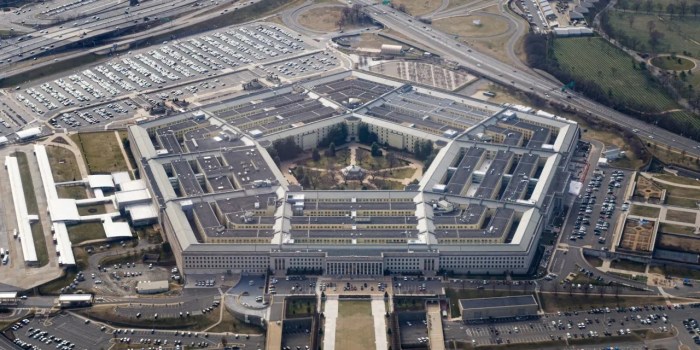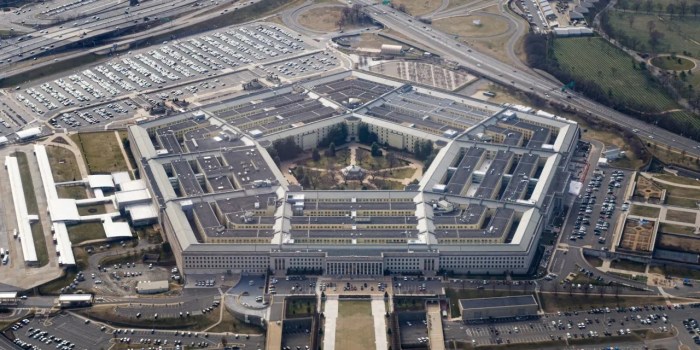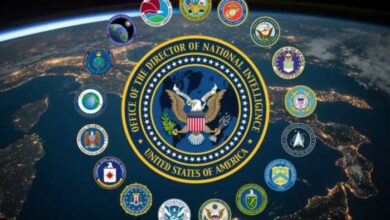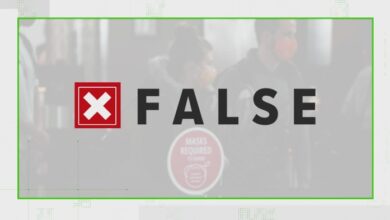
Is the Pentagon Spying on Americans?
Is the Pentagon spying on Americans? This question, once relegated to the realm of conspiracy theories, has increasingly become a subject of serious public debate. The chilling prospect of government surveillance, once confined to the pages of dystopian novels, has seeped into our everyday lives, raising fundamental questions about the balance between national security and individual privacy.
The Pentagon, as the primary defense agency of the United States, wields immense power and resources. Its surveillance capabilities, encompassing electronic, physical, and cyber monitoring, have grown exponentially in recent years, fueled by advancements in technology and the evolving landscape of national security threats.
But as the reach of surveillance expands, so too do concerns about its potential for abuse and the erosion of fundamental freedoms.
Historical Context of Surveillance
The United States has a long and complex history of government surveillance, evolving from rudimentary methods to sophisticated technological systems. This historical evolution reflects the changing nature of threats, technological advancements, and societal concerns about privacy.
The Pentagon’s Role in Surveillance
The Pentagon, as the headquarters of the Department of Defense, has played a significant role in surveillance operations throughout history. Its involvement has been driven by national security concerns, particularly during times of war and perceived threats.
- Early Surveillance:During World War II, the Pentagon utilized various surveillance techniques, including aerial reconnaissance and code-breaking, to gather intelligence on enemy activities. This period saw the development of the National Security Agency (NSA), which would later become a key player in domestic and international surveillance.
- Cold War Era:The Cold War intensified surveillance activities, with the Pentagon playing a crucial role in monitoring potential threats from the Soviet Union and its allies. This era witnessed the deployment of advanced surveillance technologies, such as satellites and electronic eavesdropping systems, to monitor communications and gather intelligence.
- Post-9/11 Surveillance:The events of 9/11 dramatically shifted the landscape of surveillance. The Pentagon, alongside other government agencies, expanded its surveillance capabilities to combat terrorism. This included the creation of new programs, such as the Total Information Awareness program, which aimed to collect and analyze vast amounts of data from various sources.
Comparison of Past and Contemporary Surveillance
Surveillance practices have evolved significantly over time, driven by technological advancements and changing societal contexts. While past surveillance methods were often limited by technology, contemporary methods leverage powerful tools, such as artificial intelligence and data analytics, to collect and analyze data on an unprecedented scale.
- Scope and Scale:Past surveillance operations were often focused on specific targets or geographical areas. However, contemporary surveillance technologies allow for the collection of data on a global scale, potentially encompassing millions of individuals.
- Data Collection and Analysis:Traditional surveillance methods relied heavily on human analysis of collected data. Today, automated systems and algorithms can analyze vast amounts of data in real-time, identifying patterns and anomalies that may indicate threats.
- Privacy Concerns:While privacy concerns existed in the past, the pervasiveness of contemporary surveillance technologies has raised significant ethical and legal challenges. The ability to collect and analyze personal data on a massive scale has prompted concerns about government overreach and the erosion of individual privacy.
Legal Framework and Oversight
The legal framework governing government surveillance in the United States is a complex and evolving landscape, balancing the need for national security with the protection of individual privacy. This framework involves a combination of laws, constitutional provisions, and oversight mechanisms.
Constitutional Provisions
The Fourth Amendment to the United States Constitution guarantees the right of the people to be secure in their persons, houses, papers, and effects, against unreasonable searches and seizures. This amendment is fundamental to the protection of privacy in the United States.
However, the Fourth Amendment is not absolute and allows for exceptions in the interest of national security.
The idea of the Pentagon spying on Americans might sound like something out of a conspiracy theory, but with the FBI digging deeper into the web, fbi digs deeper into the web , it’s not so far-fetched anymore. The lines between national security and individual privacy are blurring, and it’s making me wonder if we’re all under constant surveillance.
Relevant Laws
Several laws govern government surveillance in the United States, including:
- The Foreign Intelligence Surveillance Act (FISA): FISA, enacted in 1978, provides a legal framework for the government to conduct electronic surveillance of foreign intelligence targets. This act has been amended several times, most notably in 2008 with the passage of the FISA Amendments Act, which expanded the government’s surveillance powers.
- The Patriot Act: The Patriot Act, enacted in 2001 in response to the September 11 attacks, expanded the government’s surveillance powers, including the ability to access library records, medical records, and other personal information.
- The USA Freedom Act: The USA Freedom Act, enacted in 2015, replaced the controversial Section 215 of the Patriot Act, which had allowed the government to collect bulk data on Americans. The USA Freedom Act requires the government to obtain a warrant from a FISA court to collect such data.
Oversight Mechanisms
To ensure accountability and prevent abuse, several oversight mechanisms are in place for Pentagon surveillance activities:
- Congressional Committees: Congress plays a significant role in overseeing government surveillance activities. The House Intelligence Committee and the Senate Intelligence Committee are responsible for overseeing the intelligence community, including the Pentagon.
- The Foreign Intelligence Surveillance Court (FISC): The FISC is a specialized court that reviews government requests for surveillance warrants under FISA. The court is composed of federal judges and is tasked with ensuring that the government’s surveillance activities are conducted in accordance with the law.
- The Privacy and Civil Liberties Oversight Board (PCLOB): The PCLOB is an independent agency that provides advice to the government on privacy and civil liberties issues related to national security. The PCLOB reviews government surveillance programs and makes recommendations to ensure that these programs are consistent with the law and respect individual privacy.
Balancing National Security and Individual Privacy
The legal framework governing government surveillance in the United States attempts to balance the need for national security with the protection of individual privacy. This balance is often contentious, with advocates for national security arguing that surveillance is necessary to prevent terrorism and other threats, while privacy advocates argue that surveillance can be intrusive and violate fundamental rights.
The balance between national security and individual privacy is a delicate one. The government has a legitimate interest in protecting national security, but it must do so in a way that respects the rights of individuals.
The debate over government surveillance is likely to continue, as technology evolves and the nature of threats changes.
Types of Surveillance Conducted by the Pentagon

The Pentagon, as the headquarters of the U.S. Department of Defense, engages in various forms of surveillance to protect national security and carry out its military missions. These activities encompass a wide range of technologies and methods, including electronic, physical, and cyber surveillance, each serving a specific purpose and subject to varying degrees of oversight.
Electronic Surveillance
Electronic surveillance involves the interception and monitoring of electronic communications, including phone calls, emails, text messages, and internet traffic. It is a crucial tool for intelligence gathering, counterterrorism, and criminal investigations. The Pentagon utilizes a diverse array of technologies for electronic surveillance, including:
SIGINT (Signals Intelligence)
This involves intercepting and analyzing radio, satellite, and other electronic signals to gather information about foreign governments, military forces, and other entities. The National Security Agency (NSA) plays a significant role in SIGINT operations.
COMINT (Communications Intelligence)
This focuses on intercepting and analyzing communications, such as phone calls, emails, and text messages, to gather intelligence.
ELINT (Electronic Intelligence)
This involves the collection and analysis of electronic emissions from radar systems, weapons systems, and other electronic equipment to identify and track targets.
The idea of the Pentagon spying on Americans is unsettling, raising questions about the balance between security and privacy. But it’s not just about government overreach; it’s also about the systemic inequalities that allow the wealthy to exploit loopholes and hide their wealth in offshore tax havens.
This unchecked wealth accumulation, as highlighted in this article on tax avoidance and havens undermining democracy , further undermines democratic principles and fuels distrust in institutions. Ultimately, the Pentagon’s potential surveillance activities are just one symptom of a larger problem: the erosion of trust and accountability in our society.
TECHINT (Technical Intelligence)
This involves the collection and analysis of information about foreign technology, including weapons systems, communication systems, and other technologies.
| Type of Surveillance | Technologies Used | Purpose | Oversight Mechanisms |
|---|---|---|---|
| Electronic Surveillance | SIGINT, COMINT, ELINT, TECHINT | Intelligence gathering, counterterrorism, criminal investigations | Foreign Intelligence Surveillance Act (FISA), Presidential oversight, Congressional oversight |
Physical Surveillance
Physical surveillance involves the observation and monitoring of individuals, locations, and activities in the physical world. This can include techniques like:
Surveillance Cameras
These are widely deployed in public spaces, including streets, buildings, and transportation systems. They can be used to monitor traffic, identify suspects, and investigate crimes.
Aerial Surveillance
This involves the use of aircraft, drones, and satellites to monitor areas from above. It can be used for reconnaissance, search and rescue, and environmental monitoring.
Undercover Operations
This involves the use of undercover agents to gather information and infiltrate organizations.
Human Intelligence (HUMINT)
This involves the collection of information from human sources, such as informants, defectors, and foreign nationals.
| Type of Surveillance | Technologies Used | Purpose | Oversight Mechanisms |
|---|---|---|---|
| Physical Surveillance | Surveillance cameras, aerial surveillance, undercover operations, HUMINT | Security, reconnaissance, intelligence gathering, criminal investigations | Department of Justice oversight, Congressional oversight, internal agency regulations |
Cyber Surveillance
Cyber surveillance involves the monitoring and interception of data transmitted over computer networks. This can include:
Network Intrusion
This involves gaining unauthorized access to computer networks to collect data or disrupt operations.
Malware
This involves the use of malicious software to infiltrate computer systems and collect data or disrupt operations.
Social Media Monitoring
This involves the collection and analysis of data from social media platforms to identify potential threats or gather intelligence.
Data Mining
The Pentagon’s alleged spying on Americans raises serious questions about the balance of power and privacy. It’s a reminder that the government, just like corporations, can wield immense influence over our lives. The pharmaceutical industry’s role in the AIDS crisis, as explored in this article pharmaceutical corporations and aids , highlights the potential for unchecked power to be used for profit rather than public good.
Ultimately, whether it’s the Pentagon or big pharma, the question remains: who are we truly accountable to?
This involves the use of algorithms to analyze large datasets to identify patterns and trends.
| Type of Surveillance | Technologies Used | Purpose | Oversight Mechanisms |
|---|---|---|---|
| Cyber Surveillance | Network intrusion, malware, social media monitoring, data mining | Cybersecurity, intelligence gathering, counterterrorism | Department of Homeland Security oversight, National Cyber Security Alliance, industry best practices |
Targets of Pentagon Surveillance
The Pentagon’s surveillance activities are aimed at gathering intelligence to protect national security and counter threats. While the primary focus is on foreign adversaries and suspected terrorists, domestic citizens have also been subject to surveillance under certain circumstances. This section explores the different categories of individuals and entities targeted by the Pentagon, provides examples of specific cases involving American citizens, and sheds light on the criteria used to determine targets and the justification for targeting American citizens.
Categories of Individuals and Entities Targeted
The Pentagon’s surveillance activities target a diverse range of individuals and entities, encompassing foreign adversaries, suspected terrorists, and domestic citizens. The scope of surveillance is determined by the nature of the threat and the intelligence needs of the Pentagon.
- Foreign Adversaries:This category includes governments, organizations, and individuals deemed hostile to the United States. Surveillance activities focus on gathering intelligence about their military capabilities, political intentions, and potential threats. Examples include monitoring the activities of foreign militaries, tracking the movement of weapons, and intercepting communications related to potential attacks.
- Suspected Terrorists:Individuals or groups suspected of involvement in terrorist activities are a primary target of Pentagon surveillance. Surveillance activities focus on gathering intelligence about their plans, networks, and potential targets. Examples include monitoring suspected terrorist communications, tracking the movement of individuals suspected of involvement in terrorism, and gathering information about potential terrorist attacks.
- Domestic Citizens:In certain circumstances, the Pentagon may conduct surveillance on American citizens. This typically occurs when there is suspicion of involvement in criminal activities, potential threats to national security, or espionage. Examples include monitoring the activities of individuals suspected of involvement in criminal activities, gathering information about potential threats to national security, and investigating allegations of espionage.
Examples of Pentagon Surveillance on American Citizens
There have been several instances where the Pentagon has conducted surveillance on American citizens, raising concerns about privacy and civil liberties.
- The NSA’s PRISM Program:This program, revealed in 2013, allowed the National Security Agency (NSA) to collect data from major tech companies, including Google, Facebook, and Microsoft. The program was justified as necessary to prevent terrorism, but critics argued that it violated the privacy rights of American citizens.
The program was eventually scaled back, but concerns about government surveillance persist.
- The Patriot Act:Passed in the wake of the 9/11 attacks, the Patriot Act expanded the government’s surveillance powers, allowing the government to access private information without a warrant in certain cases. The act has been criticized for its broad scope and potential for abuse, but it remains in effect today.
Criteria for Determining Targets of Surveillance
The Pentagon uses a variety of criteria to determine targets for surveillance, including:
- Suspicion of Criminal Activity:If there is credible evidence that an individual is involved in criminal activities, the Pentagon may conduct surveillance to gather evidence.
- Potential Threats to National Security:The Pentagon may target individuals who are suspected of posing a threat to national security, such as individuals with ties to foreign adversaries or suspected terrorists.
- Espionage:Individuals suspected of espionage are a primary target of Pentagon surveillance. Surveillance activities focus on gathering information about their activities and potential contacts with foreign governments.
Justification for Targeting American Citizens
The Pentagon argues that targeting American citizens for surveillance is necessary to protect national security and prevent terrorism. They cite the need to gather intelligence on potential threats and prevent attacks. However, critics argue that the government’s surveillance powers are too broad and that the government should not be able to target American citizens without a warrant or reasonable suspicion.
They also raise concerns about the potential for abuse of power and the chilling effect on free speech and dissent.
Ethical and Societal Implications
The Pentagon’s surveillance activities raise profound ethical and societal concerns, demanding careful consideration of their potential impact on individual rights, public trust, and democratic principles. This section delves into these implications, exploring the potential for abuse, the effects on freedom of speech, and the broader societal consequences of widespread surveillance.
Ethical Concerns and Potential Impact
The ethical implications of Pentagon surveillance are multifaceted and far-reaching. While the government argues that surveillance is necessary for national security, critics contend that it poses significant threats to civil liberties and democratic values. The potential for abuse, infringement on privacy, and chilling effects on free speech are key concerns.
| Ethical Concern | Potential Impact | Mitigation Strategies | Relevant Case Studies |
|---|---|---|---|
| Abuse of Power | Surveillance data can be misused for political purposes, targeting individuals based on their beliefs or affiliations. | Strong oversight mechanisms, independent audits, and transparency measures are essential to prevent abuse. | The NSA’s PRISM program, which collected vast amounts of data on individuals, raised concerns about potential abuse. |
| Infringement on Privacy | Surveillance can intrude on individuals’ private lives, including their communications, movements, and personal information. | Clear legal frameworks, robust privacy protections, and limitations on data collection are crucial. | The Edward Snowden revelations exposed the extent of government surveillance on private citizens, highlighting the need for stronger privacy safeguards. |
| Chilling Effect on Free Speech | The knowledge that one’s communications are being monitored can discourage individuals from expressing dissenting or unpopular views. | Protecting anonymity and ensuring the right to dissent are essential to safeguarding free speech in a surveillance environment. | The use of surveillance to target activists and journalists has been criticized for its chilling effect on free speech. |
Transparency and Accountability
The issue of transparency surrounding Pentagon surveillance activities is a complex one, riddled with conflicting interests and a lack of clear information. While the government has a responsibility to protect national security, it also has an obligation to be transparent about its actions and ensure that its surveillance powers are not abused.
This section delves into the challenges of accessing information about Pentagon surveillance and examines the mechanisms in place to hold the Pentagon accountable.
Challenges in Accessing Information
Transparency regarding Pentagon surveillance is a significant challenge due to the classification of sensitive information. The government often cites national security concerns as justification for withholding information about its surveillance programs, making it difficult for the public and even lawmakers to understand the full scope of these activities.
This lack of transparency can lead to mistrust and erode public confidence in the government.
Mechanisms for Accountability, Is the pentagon spying on americans
Despite the challenges, there are several mechanisms in place to hold the Pentagon accountable for its surveillance operations.
Oversight Bodies
- The Intelligence Community Inspector General (ICIG)is responsible for overseeing the intelligence community, including the Pentagon’s intelligence agencies. The ICIG conducts audits and investigations to ensure that intelligence activities are conducted lawfully and ethically.
- The Privacy and Civil Liberties Oversight Board (PCLOB)is an independent body that advises the government on privacy and civil liberties issues related to national security programs. The PCLOB can review and make recommendations on Pentagon surveillance programs.
- The Congressional Intelligence Committeesin the House and Senate have oversight responsibilities for intelligence activities. These committees conduct hearings and investigations to ensure that the intelligence community is accountable to Congress.
Legal Challenges
Individuals who believe their privacy has been violated by Pentagon surveillance can file lawsuits in federal court. These lawsuits can challenge the legality of the surveillance programs or seek redress for damages. However, the government often uses national security arguments to defend its surveillance activities, making it difficult for plaintiffs to succeed in these cases.
Reporting and Investigating Allegations of Surveillance Abuse
The following flowchart illustrates a potential process for reporting and investigating allegations of Pentagon surveillance abuse:
Step 1: Reporting Allegations
- Individual files a complaint with the ICIG, PCLOB, or a member of Congress.
- Complaint should include detailed information about the alleged surveillance activity, including dates, times, and any evidence.
Step 2: Initial Review
- The relevant oversight body conducts an initial review of the complaint.
- This review may involve interviews, document review, and other investigative techniques.
Step 3: Investigation
- If the initial review finds merit to the complaint, a full investigation is launched.
- The investigation may involve subpoenaing documents, conducting interviews, and reviewing electronic data.
Step 4: Findings and Recommendations
- The oversight body issues a report with its findings and recommendations.
- The report may recommend changes to surveillance policies or procedures, disciplinary action against individuals involved, or other corrective measures.
Step 5: Public Disclosure
- The report may be made public, depending on its contents and national security implications.
- The public disclosure of findings can help ensure transparency and accountability.
Public Perception and Debate: Is The Pentagon Spying On Americans
Public opinion regarding Pentagon surveillance is a complex and multifaceted issue, with diverse viewpoints and concerns shaping the ongoing debate. While some Americans support the use of surveillance for national security purposes, others express serious concerns about its potential impact on individual privacy and civil liberties.
This section explores the public perception and debate surrounding Pentagon surveillance, examining key concerns, perspectives, and advocacy groups engaged in this crucial dialogue.
Public Opinion on Pentagon Surveillance
Public opinion polls and surveys reveal a mixed picture regarding public attitudes towards Pentagon surveillance. While a majority of Americans acknowledge the importance of national security, there is a significant segment of the population that expresses concern about the potential for government overreach and abuse of surveillance powers.
A 2021 Pew Research Center survey found that 55% of Americans believe that the government’s collection of data about its citizens is sometimes or often necessary to prevent terrorism, while 43% believe it is rarely or never necessary. However, the same survey also found that 62% of Americans are concerned about the government’s ability to keep this data secure.
- Concerns about Privacy Violations:A significant portion of the public expresses deep concerns about the potential for Pentagon surveillance to violate their privacy. Many individuals fear that their personal communications, online activities, and even their physical movements could be subject to government scrutiny without their knowledge or consent.
This fear is amplified by the lack of transparency surrounding the extent and nature of Pentagon surveillance activities.
- Concerns about Government Overreach:There are concerns about the potential for government overreach and abuse of surveillance powers. Critics argue that the government’s ability to collect and analyze vast amounts of personal data could be used to suppress dissent, target individuals based on their political views, or even monitor and control the population.
- Concerns about Lack of Transparency and Accountability:Many Americans believe that there is a lack of transparency and accountability surrounding Pentagon surveillance activities. The government often operates under the guise of national security, making it difficult for the public to understand the scope and purpose of its surveillance programs.
This lack of transparency fuels mistrust and undermines public confidence in the government’s commitment to protecting individual rights.
Balance Between National Security and Individual Privacy
The debate surrounding Pentagon surveillance often centers around the delicate balance between national security and individual privacy. Proponents of surveillance argue that it is essential to protect the nation from terrorism, espionage, and other threats. They point to the effectiveness of surveillance programs in preventing attacks and disrupting criminal activity.
However, critics argue that the government’s surveillance activities often go too far, intruding on the privacy of innocent citizens and chilling free speech and political dissent. They emphasize the importance of safeguarding individual liberties and ensuring that surveillance programs are subject to robust oversight and legal constraints.
- Arguments for Surveillance:Supporters of Pentagon surveillance often emphasize the importance of national security and the need to prevent terrorism, espionage, and other threats. They argue that surveillance programs can provide valuable intelligence, help to identify potential threats, and disrupt criminal activities.
They also point to the effectiveness of surveillance in solving crimes and bringing criminals to justice.
- Arguments Against Surveillance:Critics of Pentagon surveillance argue that it poses a significant threat to individual privacy and civil liberties. They contend that the government’s ability to collect and analyze vast amounts of personal data could be used to suppress dissent, target individuals based on their political views, or even monitor and control the population.
They also raise concerns about the potential for government overreach and abuse of surveillance powers.
Public Advocacy Groups and Organizations
A number of public advocacy groups and organizations are actively engaged in the debate surrounding Pentagon surveillance. These groups work to raise awareness about the potential risks of government surveillance, advocate for stronger privacy protections, and promote transparency and accountability.
- The American Civil Liberties Union (ACLU):The ACLU is a leading advocate for civil liberties and privacy rights in the United States. The organization has been critical of government surveillance programs, arguing that they often violate the Constitution and infringe on the rights of ordinary citizens.
The ACLU has filed numerous lawsuits challenging the legality of government surveillance programs and has worked to promote legislation that would strengthen privacy protections.
- The Electronic Frontier Foundation (EFF):The EFF is a non-profit organization that advocates for digital rights and privacy. The organization has been a vocal critic of government surveillance, arguing that it undermines free speech, innovation, and the public’s trust in technology. The EFF has developed a number of resources to help individuals protect their privacy online and has worked to promote legislation that would limit government surveillance powers.
- The Center for Democracy & Technology (CDT):The CDT is a non-profit organization that works to ensure that technology is used to promote democracy, freedom, and opportunity. The organization has been critical of government surveillance programs, arguing that they can be used to stifle dissent and undermine democratic values.
The CDT has worked to promote legislation that would strengthen privacy protections and increase transparency and accountability in government surveillance activities.






